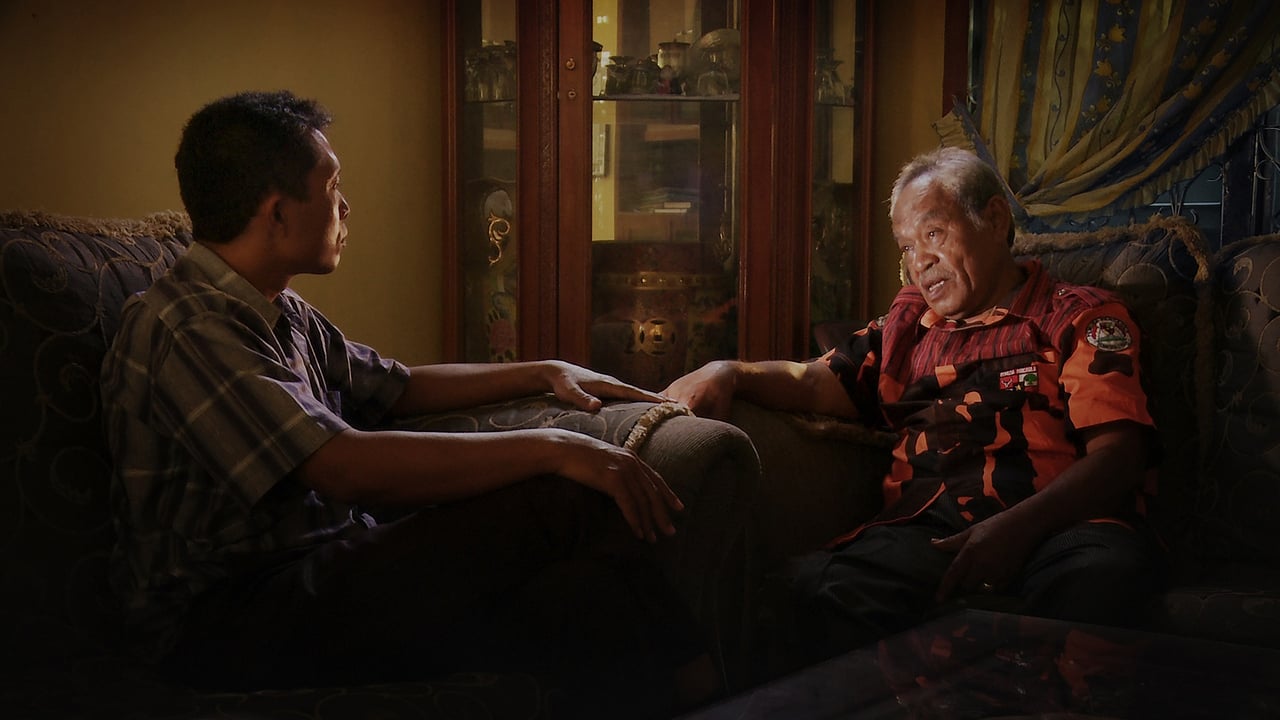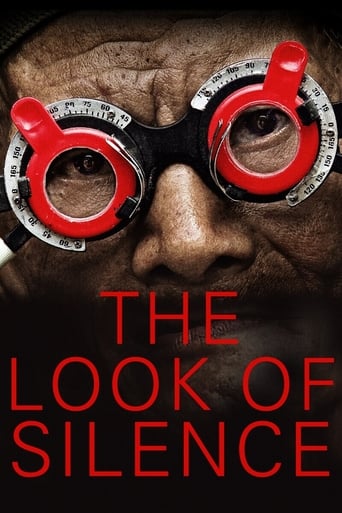

Directed by Joshua Oppenheimer, this Indonesian film is seen as almost a sequel, more a companion piece, to his previous Oscar winning documentary The Act of Killing, and it was one I had to see when it came to awards season. Basically a middle-aged man, whose brother was murdered during Indonesian killings of 1965–66, a purge of "communists", confronts the men who did the killings. For safety and concern for the man, he and man of the film's production crew are not fully identified, they are only credited as "anonymous". The film includes the man watching (what appears to be) extra footage from The Act of Killing, and video of the men who killed his brother. The man later visits some of the killers and their collaborators, including his uncle, who is pretending to have an eye exam, none of the killers appear to show any remorse, the daughter of one of them looks shaken hearing the details of the killings for the first time. Where the director's previous delivered many shocking moments and haunting footage of the real-life genocide, this follow-up film leaves most of the imagery to your imagination, there were certainly some terrible scenes of the killers admitting their crimes and almost smiling about it, and other horrible discussions, but not a lot is seen, you could argue this is a good thing and makes it less hard to watch and less shocking, but it is still an interesting documentary film. It was nominated the Oscar for Best Documentary. Very good!
... View MoreThe 2012 Oscar-nominated documentary, "The Act of Killing", garnered world-wide praise and many awards for its shocking look into the current lives of the perpetrators of genocide in Indonesia during the mid-sixties. Its filmmaker was Texas-born verified genius Joshua Oppenheimer who lives in Denmark and has been making films since 1998. "The Look of Silence" is its companion piece, and where the earlier documentary was outwardly horrifying, this one is more quietly disturbing and, I believe, the more important.After my viewing of it finished at 7 a.m., I was lowering myself into a warm bathtub when suddenly I became haunted by the feeling that headless bodies were floating past me as if I were in the Snake River where the corpses had been dumped. Indeed, I couldn't put the film out of my head the rest of the day, and haven't since. The film follows an Indonesian man named Adi Runkun whose brother had been brutally murdered in the 1965 purge of 'communists' as he confronts, in the present day and under the pretext of dispensing eye exams, the men who had carried out the killings (and who had boasted and joked about the carnage in "The Act of Killing"). We also see Adi's humane care-taking of his nearly dead father whom he bathes and consoles, and other family members who have had to live among his brother's murderers for decades. What makes this film so effective is how Adi refuses to display any emotion at the killers while the director continues to portray them as human beings rather than monsters (no revenge film this), but Adi's silent stare keeps burning into their souls as they squirm uncomfortably, stubbornly offering lame excuses while refusing any expressions of regret. By this method Oppenheimer makes the film much more of an iconic document of man's inhumanity to man, forcing viewers to contemplate parallels in history, most especially the Nazis who perpetrated the Holocaust in Hitler's Germany.There is nothing easy about this film, yet it is one of the few films you must not miss if you have a heart that pumps blood.
... View More"The Act of Killing" is one of the best, weirdest, and most disturbing movies I've ever seen. Joshua Oppenheimer's follow up documentary, "The Look of Silence," is more conventional in its approach, but it's also deeply affecting.Oppenheimer returns to the same material he mined in "The Act of Killing," the slaughter of communists in Indonesia in the 1960s. The men who actually supervised the killings are alive and well for the most part, and still exercise a gangsterish kind of control over the country. Communists aren't still being murdered overtly and en masse, but one senses that it would be easy for someone to "disappear" if he/she pushed too hard against authority. "The Act of Killing" stuck close to the murderers, and we watched in stunned disbelief as they gleefully reenacted their killings, the heroes of their own demented movies. "The Look of Silence" follows a man whose brother was murdered as part of the Communist purges before he was even born, and now wants to confront the men who carried out the murder. It's unclear, probably even to himself, what he wants from these confrontations. Possibly just an apology, possibly simple recognition of what they did. The conversations run the gamut from cathartic to downright frightening (one man obliquely hints that he could make very bad things happen to the film's protagonist if he wanted to). But the reaction from all of the killers is essentially the same: the past is the past (even though in Indonesia it isn't), why are you bringing all of this up again, can't we just agree to forget?Of course agreeing to forget is what makes horrific events like these possible to repeat. The most fascinating interviews are those not with the killers themselves but with the children of the killers, the people who have inherited their parents' legacies (on both sides of the conflict) and now must make something of the world they share. In some cases, the children learn details they never before knew and we watch them process them on screen in real time. It's difficult as a viewer to know how to feel about these inheritors of their parents' actions. On the one hand, they really can't and shouldn't be held accountable for things their parents did when they were children or possibly not yet even born. On the other hand, like it or not, we all inherit our own histories and have to at least acknowledge them, both the good and the bad, if we are to learn from them.Both "The Look of Silence" and "The Act of Killing" are infuriating to Western viewers who have been raised to believe that freedom and justice eventually triumph and that evil, either individual or systemic, gets punished. These are brilliant films, and while they certainly sow doubts in my head about the state of mankind, I feel like a better person for having seen them.Grade: A+
... View MoreWith just two films to his name, both about the Indonesian mass-murders of the mid-1960's Oppenheimer has become the most important documentarian of his generation. His second film, "The Look of Silence", coupled with his "The Act of Killing" has created a sea- change in the Indonesian truth, justice and reconciliation movement. Forcing new laws to be written and putting the government in a defensive position against the nation's media.But Oppenheimer is more than an activist. He's an artist. His films are contemplative, playful and quietly confrontational. His visual attack is succinct, his marriage of form and theme is flawless and his moral intent is thunderous.Where "Act of Killing" was concerned with a larger study of post-massacre Indonesia, "Look of Silence" chooses a more intimate landscape. Geographically, emotionally and cinematically it is regional. Concerned with a single killing, the men who did it – directly and indirectly - the family it affected and the small village that has lived with questions about other killings like it for fifty years. Where "Act of Killing" lived in absurdist grand cinema, "Look of Silence" exists in tight close-ups of the perpetrators, survivors and truth-seekers. More than anything, more than words, their faces tell the story. So much happens behind the eyes, around the corners of the mouth, in unspoken glances. The horror, doubt, guilt and seemingly impossible reconciliation stirs below the surface. For all the cinematic flex of "Act of Killing", this contained take on the same material, seems more haunted and human.The star of the film, Adi the eyewear peddler, pursues this mission with intelligence and courage. We meet his family. His happy playful daughter, his thoughtful son, his cautious loving wife, his ageless mother (probably the most engaging character captured on film this year), his wisp of an ancient father, and his memory of a murdered brother, looming over everything. From them he finds the courage to question murderer after murderer face-to-face. The combination of his profession as an optometrist with his quest to seek truth would seem heavy-handed if it were fiction, but nothing here is inauthentic. In showing all of Adi's family, from the fresh and young, to the spent and dying, we see the full arc of life.Lastly, the film makes a glancing but firm indictment against the American anti-Communist fervor that fed into - and the American corporations that profited from - these killings. It gives strong evidence that the Cold War, the war of ideology and the murder of millions, allowed for, and was even fought for, Western corporate dominance in places like this. And here the grinding up of human beings for profit in this situation is undeniable. Oppenheimer wants to make sure no one involved gets off without having to face, if not their own role in the massacre of millions, then at the very least, their culture's.And so it goes, the people (wives, mothers, daughters, sons, fathers, husbands), the silence, the haunted jungle hum that fills most of the auditory space in the film, the great and overwhelming significance of it all everything pools together to show us something words alone can't manage. Something about how a horror can be so great that its impact can loom over generations. About living with debilitating fear of those who have claimed power over you through violence. About the most nightmarish tendencies in humanity, and our courageous capacity to overcome the worst of ourselves. About just how difficult it is to look into the eyes of a killer and say, "I know what you did." And more profoundly, more frighteningly "I know you."
... View More